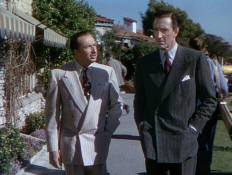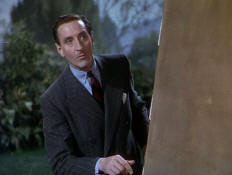Bathing Beauty
|
|
Bathing Beauty NEW SKELTON PICTURE MAKES STRONG APPEAL TO EYE AND EAR; LOADED WITH POPULAR STUFF While the latest of the Red Skelton films is hardly his best, it is certain to do spanking well at the box office, thanks to the abundance of popular stuff that has gone into the picture's making. The film is a special treat for the devotees of jive and nonsense. The picture filmed in exciting Technicolor is strong on enticements for eye and ear but extremely weak on story content. Even the comedy has been subordinated to the physical and musical aspects of the show. The picture is virtually one succession of musical and production numbers. Skelton is cast as a songwriter who allows his work to wait while he pursues a romance with Esther Williams, the bathing beauty of the title who is member of a girls' school faculty. His marriage to the girl doesn't set well with Basil Rathbone, producer of a show for which the comic is commissioned to do the songs. So that Skelton will devote himself to his songwriting Rathbone splits the couple by getting the guy innocently involved with another woman. Skelton enrolls in the college in his attempt to win Miss Williams back. He succeeds in explaining everything after a series of ludicrous situations. The story gives Miss Williams, a swimming star, plenty of opportunity to perform in the water. Her biggest splash is in an extravagant water ballet that winds up the footage. Skelton is good everytime he's given a real chance to do his stuff. He has several sequences that are solid laugh-getters. Miss Williams brings a swell figure to a role that makes little demand upon her as an actress. Rathbone makes the most of a short part. Others to be noted are Nan Bryant, Ann Code and Carlos Ramirez and Lina Romay; the latter two of whom sing several solo numbers superbly. Harry James and Xavier Cugat and their bands are very much in evidence. Jack Cummings gave the film an opulent production. George Sidney directed. The script is the result of the labors of no less than seven writers. Harry Stradling's color photography and the art direction of Cedric Gibbons, Stephen Goossen and Merrill Pye merit much credit for the film's visual appeal. DIRECTION: Direction PHOTOGRAPHY: Aces. —The Film Daily, May 31, 1944 |
"Lavishly produced in Technicolor, Bathing Beauty is another M-G-M top-flight musical film which should register substantially with the customers." —Motion Picture Daily, May 29, 1944
"This excellent musical has comedy skits and songs and orchestral numbers so logically interpolated into the plot that they do not divert interest but complement the story. Red Skelton is at his best and gives two exceedingly amusing pantomimes. The popular music is well presented, color is unusually fine, and the water carnival with lovely Esther Williams as the star, is an exquisitely beautiful exhibition." —Motion Picture Reviews, May and June 1944
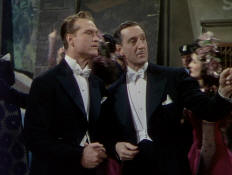 Red Skelton and Basil Rathbone |
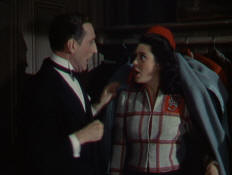 Rathbone and Jacqueline Dalya |
"Filled with plenty of good gags, scenes, and beautiful girls, the music of Harry James and Xavier Cugat, the comedy of Skelton, and a colorful and a spectacular water ballet, this should hit the popularity jackpot." —The Exhibitor, May 31, 1944
"Although Red Skelton hasn't so much to do as in several of his earlier films, he makes every moment count when he is around. There are times when he is excruciatingly funny. Plenty of entertainment here." —The Independent Film Journal, June 10, 1944
|
Bathing Beauty For all those who are not getting to the beaches this summer, MGM opens and closes its latest Technicolor musical with a stunning display of girls in bathing suits and swimming in waltz time which far outdoes Billy Rose's Aquacade of recent memory. Contrasting rhythms by Harry James and Xavier Cugat hold the stage for much of the time between, but it remains for the comedy of Red Skelton to keep the production from sagging in the middle. Seven writers shared the burden of the story, although there's some indication that all of them threw in the towel. It stacks up as a ruse to get Skelton into a girls' college in search of his bride, the beauteous Esther Williams; into a class in choral singing where he gives a demonstration in "boogie," and incidentally a grand take-off on the Rockettes; and finally into a ballet class, complete with pink sating bodice and fluffy net skirt. The last is a hilarious sequence in which Red manages, by a combination of grace and ingenuity, to lose a sticky candy paper and escape the demerit system by which the faculty hopes to expel him before parents' day. Lina Romay adds zest to Cugat's Latin American specialties and Carlos Ramirez sings the ballads expertly. Harry James trumpet holds the spotlight for several numbers that should start the youngsters jumping. Helen Forrest is in for one song, but it clicks. And Ethel Smith, a lady organist, swings into some jive that will rock the house. Producer Jack Cummings tops this array of talent with a water carnival featuring the form and grace of Esther Williams on a spectacular set of fountains and flame and color, and some ensemble swimming of unusual precision and beauty. George Sidney's technique as director appears to have been to give each performer free rein at the proper time, and the result is variety entertainment with verve, but a bit short on continuity. Previewed at Loew's Criterion theatre in New York, where a mid-day audience sprinkled its laughs throughout. Reviewer's Rating: Good. —E. A. Cunningham, Motion Picture Herald, May 27, 1944 |
"A lavish production rich in light-headed fun, light-hearted romance, lovely ladies and lilting music. It finds Skelton at his best and gorgeous Esther Williams firmly established in stardom. Slightly terrific mass entertainment." —Showmen's Trade Review, May 27, 1944
"Metro has put on another of its spectacular musical shows combining all the Technicolors of the rainbow and much of the talent on its lot." —Bosley Crowther, The New York Times, June 28, 1944
"Lively and gay, this latest in MGM's roster of glittering Technicolor musicals should be received well by the rank and file of picture-goers." —Harrison's Reports, June 3, 1944
 The Astor Theater in New York City, where Bathing Beauty was making a splash. |
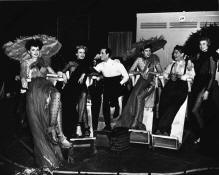 Basil Rathbone and Red Skelton chatting with some of the female cast members. |
See Page Three for pictures of posters, lobby cards, and promo photos.
Back to Page One, review of Bathing Beauty







